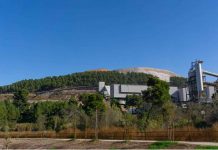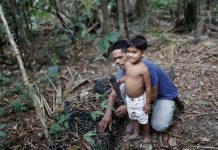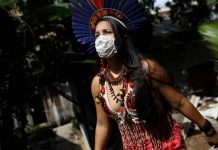Sao Paulo – On October 22, 2020, a virtual ceremony, for the 37th Annual Robert F. Kennedy Human Rights Award, was given to 36-year-old, Allessandra Munduruku, for “her work defending a beautiful culture and livelihoods for Indigenous peoples rights in Brazil.
The Robert F. Kennedy Human Rights Award honors those who embody Robert F. Kennedy’s belief that the power of individual moral courage can overcome injustice. Allessandra Korap Munduruk, born in the village of Praia do Indio, in the municipality of Itaituba (Para) in the Brazilian Amazon region. As an early childhood education teacher in 2017-18, being a human rights defender and head of the Munduruku warrior women of the Middle Tapajos and continues her knowledge in Law school
As the attention of her activism grows, it is evident when she has had her home broken into and had been threatened over her work defending her people and their Amazon land from illegal miners, loggers, hydropower plants, and other threats, while the government continues pushing for the development of a culture that believes in connection to the Earth as many have done with Indigenous people of Canada since the first contact with Europeans on Turtle Island.
In an interview with Thomson Reuters Foundation, Allessandra humbly states, “the $30,000 prize has been donated to her indigenous community. To have the additional backing and support of Kerry Kennedy and her entire organization, especially during the pandemic, will make all the difference as we continue to fight for our rights, including the demarcation of our lands to ensure that Indigenous peoples have their autonomy, and for the fight of women who are also the strength of the resistance.”
Kerry Kennedy, daughter, President of Robert F. Kennedy Human Rights, “ Allessandra has heroically faced intimidation and violence for defending Indigenous rights across Brazil – including the ability to oppose projects and developments that affect her peoples. She is a champion of women’s rights, Indigenous rights, and the foundational right of all human rights – civic space. Civic space protects the right to dissent, to advocate and to defend human rights, free of government reprisal. It is the keystone of a functioning democracy.”
She believes, the prize means more struggle, and it comes at a time to strengthen the indigenous people.
Allessandra conveys, “my greatest wealth is the river without a dam, without mining. It means being free. It means not being bothered by any government or companies. Progress is our good life. Getting involved with Indigenist Missionary Council in 2015, taught about law.”
Being shy and fearless her voice of persistence had earned the respect of the Chiefs and warriors. Side by side and it empowered the women to continue in their resistance, especially with having a President who has proactively removed protections for Indigenous tribes and have insulted them on numerous occasions.
What sets this Awards Program apart is that all honorees receive ongoing support for their important work for Robert F. Kennedy Human Rights – through strategic litigation training and capacity-building, and advocacy before governments, international organizations, and other institutions.
The keynote address this year is former United States Secretary, John Kerry, on the countless threats and challenges indigenous communities face around the world.
Previous winners of the Human Rights Award include the Angry Tias and Abuelas of the Rio Grande Valley 2019 for its pursuit of dignity and justice for those seeking asylum at the U.S.-Mexico border: Alfredo Romero 2017 for his work with Foro Penal providing pro bono legal assistance to victims of arbitrary detention, torture, and other human rights violations in Venezuela; Frank Mugisha 2011 for championing the human rights of sexual minorities in Uganda, eventually overturning the country’s law which criminalized homosexuality; Magodonga Mahlangu Women of Zimbabwe Arise (WOZA) 2009 fir empowering women to strive for political and social change in Zimbabwe, and the Coalition of Immokalee Workers 2003 for its efforts to end the exploitation of migrant workers in the U.S. agricultural industry, a form of modern-day slavery that persists to this day.





